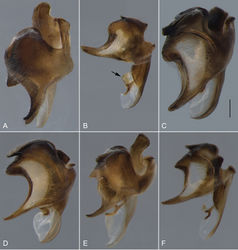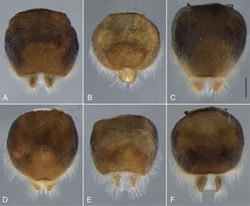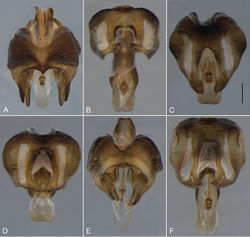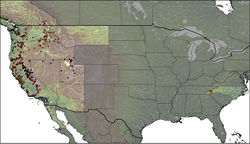Eulonchus sapphirinus
| Notice: | This page is derived from the original publication listed below, whose author(s) should always be credited. Further contributors may edit and improve the content of this page and, consequently, need to be credited as well (see page history). Any assessment of factual correctness requires a careful review of the original article as well as of subsequent contributions.
If you are uncertain whether your planned contribution is correct or not, we suggest that you use the associated discussion page instead of editing the page directly. This page should be cited as follows (rationale):
Citation formats to copy and paste
BibTeX: @article{Borkent2016ZooKeys, RIS/ Endnote: TY - JOUR Wikipedia/ Citizendium: <ref name="Borkent2016ZooKeys">{{Citation See also the citation download page at the journal. |
Ordo: Diptera
Familia: Acroceridae
Genus: Eulonchus
Name
Eulonchus sapphirinus Osten Sacken, 1877 – Wikispecies link – Pensoft Profile
- Eulonchus sapphirinus Osten Sacken, 1877: 276
References
Osten Sacken 1878[1]: 99 (catalogue); Melander 1902[2]: 181 (California); Aldrich 1905[3]: 221 (catalogue); Kertész 1909[4]: 12 (catalogue); Woodworth 1913[5]: 152 (California); Cole 1919[6]: 36 (key, notes, figs, California, Utah, Oregon), 1927[7]: 422 (male genitalia); Cole and Lovett 1921[8]: 238 (Oregon); Brunetti 1926[9]: 582 (Washington); Essig 1926[10]: 559 (notes, California and Oregon); Knowlton et al. 1939[11]: 6 (Utah); Sabrosky 1948[12]: 389 (key, notes); Schlinger 1965[13]: 404 (catalogue); Cole 1969[14]: 221 (notes); Poole 1996[15]: 36 (checklist).
Common name
Northern Sapphire or Emerald.
Diagnosis
Antennal flagellum relatively short, cylindrical or tapered; proboscis straight, shorter than length of body; ocellar tubercle trifurcate; legs yellow; calypter margin pale; body colour metallic green, blue or purple.
Redescription
Body length: 8.3–11.9 mm, Wing length: 7.1–12.0 mm. Head. Flagellum red-brown or dark brown, male flagellum cylindrical, shorter than head height; scape and pedicel brown; clypeus elongate, extending beyond oral cavity, rounded with flat area dorsally, surface glossy, glabrous, black-brown; labial palp brown, length extending anteriorly beyond proboscis at point of attachment; margin of oral cavity (parafacial) pilose, proboscis length extending to middle of abdomen or equal to abdomen length; ocellar tubercle trifurcate, processes relatively short, subequal (posteromedial processes rounded), height equal to width; median ocellus present, greatly reduced or absent; occiput metallic green-blue, blue or purple, pile densely white or yellow. Thorax. Metallic green, blue or purple, setal pile white or yellow; coxae brown or black with metallic blue (and purple) sheen; femora yellow; tibiae dark yellow; tarsi dark yellow (distal tarsomeres often darker); calypter margin yellow to light brown, membrane transparent or translucent; haltere entirely light brown to yellow. Abdomen. Colour highly variable, metallic olive green, bright green or blue violet, vestiture white or yellow, dominant setae appressed or erect, pile posteriorly directed, marginal band of dense thicker setae on T3–4, or laterally directed pile on T2–4. Male genitalia (Figs 17D, 18D, 19D). Epandrium ovate, thinned at the apex, with posterior margin slightly concave; gonocoxite taller than wide, with broad fenestrae; aedeagus broad at the apex, bilobate in posterior view, not heavily sclerotized laterally.
Type material examined
Lectotype male (designated here), MCZ, “Webber Lake, Cal/ July 23. O Sacken” [white]; “West. Dipt./ O. Sacken.” [white]; “TYPE/ 4/ 1076” [red and white]; “MC-ENT/ 00303277” [white]; “LECTOTYPE ♂/ Eulonchus sapphirinus/ Osten Sacken/ Des. C.J. Borkent 2015” [red]; specimen condition: excellent, no parts missing. Body length: 9.2 mm, wing length: 8.7 mm. Paralectotype female, MCZ, “Webber Lake, Cal./ July 23. O. Sack.” [white]; “O. Sacken./ West. Dipt.” [white]; “Type/ 5/ 1076” [red and white]; “MCZ-ENT/ 00303278” [white]; “PARALECTOTYPE ♀/ Eulonchus sapphirinus/ Osten Sacken/ Det. C.J. Borkent 2015” [yellow]; specimen condition: excellent, no parts missing. Paralectotype male, MCZ, “Webber Lake,/ Cal. July 26./ O. Sacken” [white]; “O. Sacken./ West. Dipt.” [white]; “Type/ 3/ 1076” [red and white]; “MCZ-ENT/ 00303276” [white]; “PARALECTOTYPE ♂/ Eulonchus sapphirinus/ Osten Sacken/ Det. C.J. Borkent 2015” [yellow]; specimen condition: very good, tarsi of both mid legs missing, genetic anomaly with only one antenna present. Paralectotype male, paralectotype female [mating pair on same pin], MCZ, “Webber Lake, Cal./ July 26 O. Sacken” [white]; “O. Sacken./ West. Dipt.” [white]; “Aug-Dec 2006/ MCZ Image/ Database” [white]; “Eulonchus/ sapphirinus/ O.S.” [white]; “MCZ-ENT/ 00001076” [white]; “PARALECTOTYPE ♂/ Eulonchus sapphirinus/ Osten Sacken/ Det. C.J. Borkent 2015” [yellow]; specimen condition: male, very good, tarsi of hind legs missing, left flagellum missing; female, excellent, no parts missing.
Other material examined
Listed in Table 3 (Suppl. material 1).
Distribution
(Fig. 20). Nearctic: California, Idaho, Nevada, Oregon, Utah, Washington (USA); British Columbia (Canada).
Ecology
Eulonchus sapphirinus has been recorded visiting the flowers of 19 different plant families and 30 different species (Table 2). Eulonchus sapphirinus adults have been observed exhibiting strong fidelity to a single flowering plant species, suggesting their role as important pollinators (Borkent and Schlinger 2008a[16]).
Biology
Host unknown.
Comments
Eulonchus sapphirinus is the sister species to the eastern Eulonchus marialiciae as both have characteristic bright green metallic colouration, short proboscis, yellow legs and similar shaped male genitalia. The shape of the antennal flagellum and colour of calypter separate the two species.
Taxon Treatment
- Borkent, C; Gillung, J; Winterton, S; 2016: Jewelled spider flies of North America: a revision and phylogeny of Eulonchus Gerstaecker (Diptera, Acroceridae) ZooKeys, (619): 103-146. doi
Images
|
Other References
- ↑ Osten Sacken C (1878) Catalogue of the described Diptera of North America. Smithsonian miscellaneous Collections 16, 276 pp.
- ↑ Melander A (1902) Notes on the Acroceridae. Entomological News 13: 178–182.
- ↑ Aldrich J (1905) A catalog of North American Diptera. Smithsonian miscellaneous collections 46, 680 pp.
- ↑ Kertész K (1909) Catalogus Dipterorum hucusque descriptorum. Vol. 4, Oncodidae, Nemestrinidae, Mydaidae, Apioceridae, Asilidae. Museum Nationale Hungaricum, Budapest, 349 pp.
- ↑ Woodworth C (1913) Guide to California insects. The Law Press, Berkeley, 380 pp. doi: 10.5962/bhl.title.49919
- ↑ Cole F (1919) The dipterous family Cyrtidae in North America. Transactions of the American Entomological Society 45: 1–79
- ↑ Cole F (1927) A study of the terminal abdominal structures of male Diptera. Proceedings of the California Academy of Sciences 16: 397–499.
- ↑ Cole F, Lovett A (1921) An annotated list of the Diptera (flies) of Oregon. Proceedings of the California Academy of Sciences 11: 197–344. doi: 10.5962/bhl.title.57901
- ↑ Brunetti E (1926) New and little-known Cyrtidae (Diptera). Journal of Natural History Series 9 18: 561–606. doi: 10.1080/00222932608633552
- ↑ Essig E (1926) Insects of Western North America. Macmillan, New York, 1035 pp.
- ↑ Knowlton G, Harmston F, Stains G (1939) Insects of Utah: Diptera. Utah Agricultural Experiment Station Mimeograph Series, Technical, No. 200, Part 5, 22 pp.
- ↑ Sabrosky C (1948) A further contribution to the classification of the North American spider parasites of the Acroceratidae (Diptera). The American Midland Naturalist Journal 39: 382–430. doi: 10.2307/2421592
- ↑ Schlinger E (1965) Acroceridae. A Catalog of the Diptera of America North of Mexico, 403–407.
- ↑ Cole F (1969) The Flies of Western North America. University of California Press, Berkeley and Los Angeles, 693 pp.
- ↑ Poole R (1996) Diptera, Lepidoptera, Siphonaptera. Nomina Insecta Nearctica. A checklist of the insects of North America. Vol. 3. Entomological Information Service, Rockville, 1143 pp.
- ↑ Borkent C, Schlinger E (2008a) Flower-visiting and mating behaviour of Eulonchus sapphirinus (Diptera: Acroceridae). The Canadian Entomologist 140: 250–256. doi: 10.4039/n07-060






